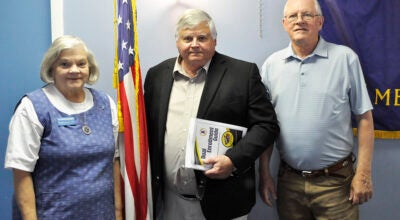Ruling leaves businesses unsure about new overtime regs
Published 3:00 am Tuesday, November 29, 2016
Pike County businesses preparing to make the switch to new federal overtime rules this week will now have to decide what to do since a judge blocked the rules last Tuesday.
The new overtime rule would have taken effect on Wednesday and many small businesses around the country were already preparing for it. But U.S. District Judge Amos Mazzant granted a preliminary injunction against the ruling on Tuesday to postpone the regulations from going into effect. Mazzant presides over the Eastern District of Texas.
Now the question for many businesses is whether or not to follow through on those plans with the possibility that the regulations could still be implemented in the future.
“They were prepared for it and now it’s not happening, so it’s a matter of whether to go ahead and convert or not,” said Kathy Sauer, president of the Pike County Chamber of Commerce. “It’s perplexing to some whether or not to go ahead and do it.”
The new rule would have raised the bar for overtime exemption to $47,467, over twice the current threshold of $23,660.
That means that salaried workers making under that $47,467 threshold would not be exempt from being paid overtime wages for hours worked over the 40-hour workweek limit.
For example, Sauer explained that the Chamber would have had to start tracking hours when holding weekend events instead of the flexible schedule that the business employs now.
While the regulations may have had good intentions, Sauer explained that the rules could negatively affect small businesses in some ways.
“The reason for the rule was to ensure fairness for employees,” Sauer said. “But when you are on salary, you can arrange your schedule around something special you want to go to like your kid’s game or something that’s happening at school. So it works out well for some people, but it can be abused.”
Many retailers and retail organizations around the nation applauded the injunction as a victory that will help businesses. Sauer said the biggest victory for retailers with the injunction is that businesses will not have to make the change during the holiday shopping season, the busiest retail time of the year.
David French of the National Retail Federation called the rules “a reckless and aggressive overreach of executive power” and “just plain bad public policy.”
Rob Green, executive director of the National Council of Chain Restaurants, said that the “timeout” ruling will “allow Congress to vote to stop the regulation once and for all and would also let the incoming Trump administration create a more realistic and workable overtime solution based on sound economic considerations.”
Another victory Sauer talked about is the possibility that if the rules are merely postponed and not completely done away with, the rules could be revamped to factor in the different economies of different states. “Another question is if the regulations are implemented at a later time, will the rate be set nationally or by state?” Sauer said. “Originally the rate didn’t take that into account.”





